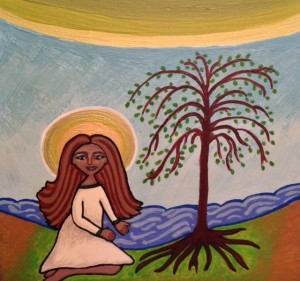
As a young man, Saint Nicholas was traveling by sea and the boat was overtaken by a storm. He prayed and the crew was amazed as the waters quieted. He apparently knew about the emergency procedure.
Commonly known for his good deeds on behalf of the poor, he also became known as the patron saint of sailors and merchants.
What do all of the following characters have in common?
- One is lost and alone, wandering in the desert. Perhaps due to poor planning, bad directions, or an unexpected detour.
- One is languishing in prison for crimes committed. He is receiving just penalty for his lawless misdeeds.
- One is experiencing acute suffering due to irresponsible behavior. Wiser decisions might have kept him from his pain and shame.
- One is a merchant marine at sea, struggling for survival in a raging storm. He was just doing business and living life, but God brought the storm upon him for unknown reasons.
All the characters described in Psalm 107 are in dire straits, but each has reached his predicament in a different way. Some just happened upon their distress, and others found trouble on their own.
How would you write the end to each of their stories? We can all root for the sailor to outlast the storm, emerging triumphant with a tale to tell his children and grandchildren. We can breath a sign of relief when the wanderer sees a city in the distance — finally, a destination where he will receive comfort and relief. But what about the criminal? Would we be satisfied to let him languish in prison? He’s just getting what he deserves, right? What about the foolish character? He didn’t do anything illegal, but he just should have known better! Hmmm. Maybe we would allow him to experience a miraculous recovery, but walk with a limp for the rest of his life — as a solemn reminder.
In Psalm 107, however, we find a God who is more ready to help than we might be. We find that he leads wanderers to dwelling places. He stills raging waters and brings weary and battered sailors to port. He rescues and heals the foolish, delivering them out of destruction brought upon themselves. He even brings prisoners out of the shadows and “shatters doors of bronze and cuts in two the bars of iron.” (v. 16)
Do you find it surprising that God graciously, and even enthusiastically, delivers all four men? Despite their apparent disparities in character, they were all able to access God’s mercy, and even his favor. They did have one thing in common as it turns out. They all did one very important thing. They each implemented the all-purpose, emergency response procedure: “they cried out to God in their trouble.” (vs. 6, 13, 19, 28)
Perhaps we don’t write stories with harsher endings for others, but for ourselves. Maybe we have resolved to suffer. Maybe we even deserve to suffer. Nevertheless, you have no crisis that has taken God by surprise. Follow the prescribed procedure. Then watch and wait. Modes of deliverance often differ as much as the nature of the distress. Sometimes the delivery is by degrees and sometimes it is by sudden emancipation. Sometimes the delivery is not seen; not absent, just not observable to the average onlooker. After all, the mysteries of God cannot be fully disclosed in a single chapter. In fact, the entirety of scripture does not provide any formulas or decision trees to predict divine acts. Sorry.
He does reveal a singular motivation for the his actions in all these scenarios, however. Immediately preceding these case studies, we read that “He is good and his love endures forever.” (I know your next question. There are entire books written to address it, so I’m sure it at least warrants its own stand-alone blog posting at a later date.)
And although He keeps the instructions simple in the moment of crisis, there are several follow up procedures. Giving thanks is a repeated theme (vs. 1, 8, 15, 21, 31). Then there is the exhortation “to let the redeemed of The Lord say so.” (v. 2) Finally, we are left pensive in verse 42…”Whoever is wise, let him attend to these things; let them consider the steadfast love of The Lord.”
And, how else will we learn to sing songs of deliverance? (v. 22)
Jesus, lover of my soul, let me to Thy bosom fly,
While the nearer waters roll, while the tempest still is high.
Hide me, O my Savior, hide, till the storm of life is past;
Safe into the haven guide; O receive my soul at last.
Other refuge have I none, hangs my helpless soul on Thee;
Leave, ah! leave me not alone, still support and comfort me.
All my trust on Thee is stayed, all my help from Thee I bring;
Cover my defenseless head with the shadow of Thy wing.
Wilt Thou not regard my call? Wilt Thou not accept my prayer?
Lo! I sink, I faint, I fall—Lo! on Thee I cast my care;
Reach me out Thy gracious hand! While I of Thy strength receive,
Hoping against hope I stand, dying, and behold, I live.*
*From “Jesus Lover of my Soul” by Charles Wesley, Hymns and Sacred Poems, 1740.
Copyright © 2014. The Literate Lyoness.
 Leave your own tracks…Tell someone about your own stories of deliverance.
Leave your own tracks…Tell someone about your own stories of deliverance.


